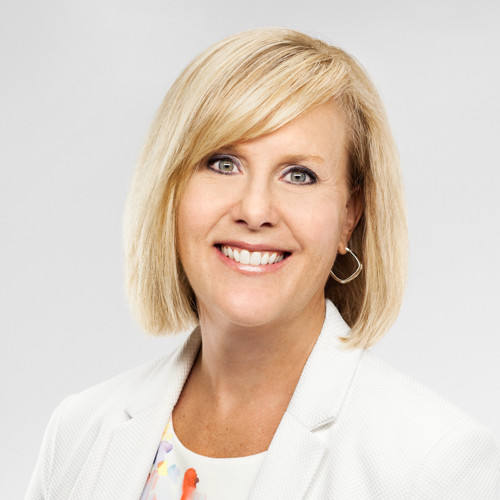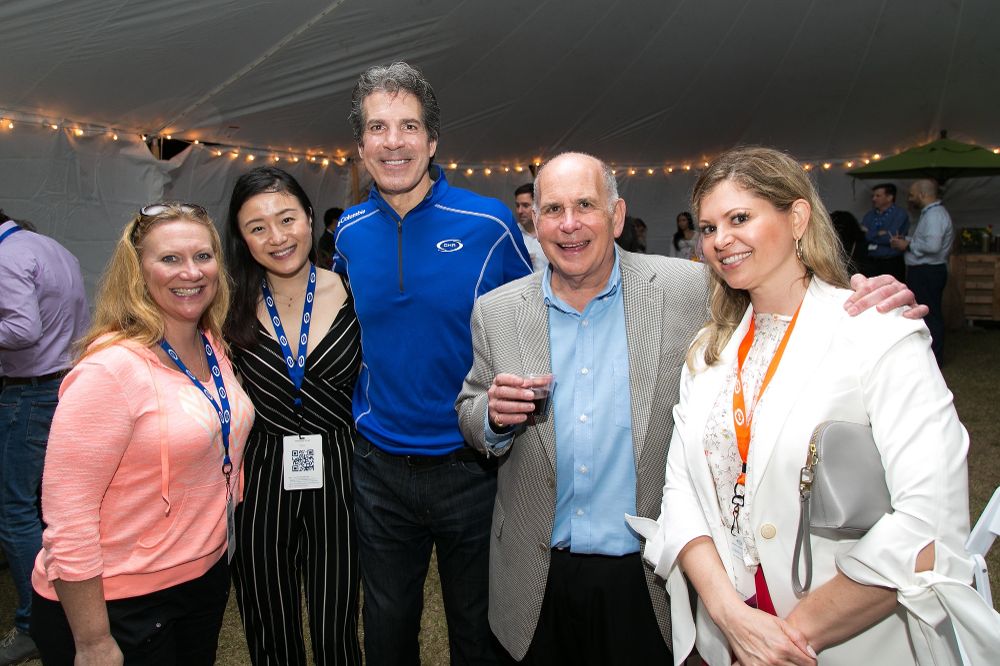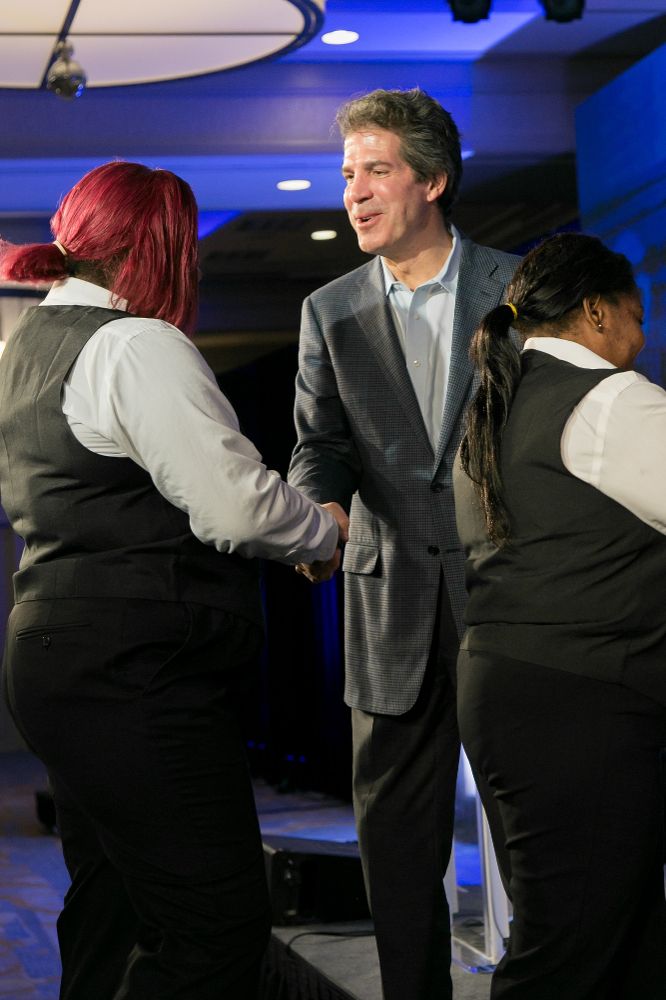
The first day on a job and the last day are the most common times most people interact with their HR or People teams.
I had the chance to speak with both Crescent Hotels & Resorts‘ outgoing SVP of Human Resources, Laura Warner on her last day with the hospitality management company before retirement, as well as with incoming SVP of People & Culture Julie Farnsworth, who is now leading the people function for the organization, on the same day.
We had a wide-ranging conversation about working in hospitality, becoming an employer of choice, mentorship – and much more:
- From “Human Resources” to “People and Culture”
- Laura’s career journey to hospitality leadership
- Julie’s career journey to hospitality leadership
- Practices for staying in touch with frontline staff
- Developing and maintaining culture through executive leadership
- The most important thing when hiring in hospitality
- How to identify people with a “heart for hospitality”
- The importance of benefits in becoming an employer of choice
- Travel as a compelling benefit
- The importance of listening
- Promoting from within to build culture
From “Human Resources” to “People and Culture”

Traditionally, the team responsible for the staff of an organization has been Human Resources. Now, that’s changing.
“We now call our organization ‘People and Culture,’ and this better reflects the foundation of who we are,” Laura shared. “People join companies because of the people in leadership they will work for. They don’t join for the brick and mortar. What we do, and who we do it with is more important than ever before.”
Laura’s career journey to hospitality leadership

Laura started her career working in food and beverage and then held various roles throughout hotel departments. Building experience in operations helped her as her career progressed. “I gained invaluable insight into leading people and culture that served me later in my career,” she reflected.
Laura advises people to begin their careers by getting experience working on the front lines, which really provides an understanding of the intricacies of a hotel’s operation. “That really gives you context and insight that will make a difference as you continue to move forward in your career.”
When Laura first began work at the corporate office it was an adjustment. “I would get up in the morning and walk around the hotel so I could interact with our teams.” But Crescent Hotels & Resorts’ president, founder, and CEO, Michael George gave her some advice that has stuck with her since: “Working in a corporate leadership role may have less people interaction at times, but it provides an opportunity to do so much more for people overall.”
Julie’s career journey to hospitality leadership
“If I had to summarize my career in three words, it would be the ride of my life,” Julie said with a laugh. “I can’t imagine doing anything else.”
Julie began her career with a restaurant group and thought she would manage restaurants her whole career. But an opportunity at a hotel presented itself and she’s never looked back.
“I’ve always said that being an operations leader helps you for the rest of your career – whatever you do. As I transitioned into other leadership roles, working in operations helped me better understand what my associates were going through.”
Plus, no one could pull anything over her. “Sometimes an associate will say ‘you have no idea what we go through to do our jobs.’ I’m able to say ‘Actually, I did walk in your shoes. I’ve made beds, I’ve done night audits, I’ve checked people in at the desk, I’ve served tables, and I’ve been yelled at by guests.’ And all of that makes me a lot more empathetic to what they are going through and how I can be a better support to them.”
Eventually, it was a love of supporting associates that prompted Julie to move out of operations onto the People team.
“I realized that I preferred helping people manage people as opposed to managing people myself. That is where I thrived and where I was best.”
What’s compelling about working in a hotel or at a hotel company versus restaurants or other businesses?
“Restaurants operate in strictly defined categories. You either serve lunch and dinner or you serve breakfast. Guests come in, they’re hungry, you feed them, they go home, and they come back. That’s how it works. A hotel is a very different experience. It’s more intimate. People are sleeping in your building. They are bathing in your building. They are having life events in your building: weddings, baby showers, funerals, etc. The ability to make an impact and be a part of someone’s life is immeasurable.”
This combination of there never being a dull moment and the opportunity to make an impact is what makes a career in hospitality so compelling to Julie and so many others.
“There are so many moving parts and opportunities for our team members to grow and develop and make an impact. And that’s a big difference of career and hospitality can offer versus working in other industries.”
Practices for staying in touch with frontline staff

“The one thing I’ve always told myself since I moved into a corporate role is that I will never lose touch with my colleagues in the field,” Julie shared.
One of the ways she does that is by running any new initiative through a multi-layered review process that ensures frontline associates and other stakeholders have their voices heard on any proposed change.
“We have something within our company called the General Managers Advisory Council. We run any proposed changes through them and get their take on what they think might work. If they tell us we’re crazy, we shut it down because they know what it’s like in the field.” If initial feedback is positive, they move to a pilot stage so they can involve as many people as possible who are going to be involved in or use the proposed solution.
“Getting buy-in from the team that’s actually going to do whatever we are proposing is critical for our success,” Laura added.
As much as possible, Julie and Laura travel to meet teams in the field and they augment in-person time with other forms of communication to maximize collaboration.
“We connect over Zoom a lot and make ourselves available to speak when our teams need us. I don’t punch a clock. I’m based in Toronto and so I span five time zones. If my hotel in Vancouver calls me at 8 pm it’s only 5 pm there. So I pick up my phone because they are clearly calling me because they need me,” Julie said.
It’s a balancing act for them because while hospitality is a 24/7 business, finding some work-life balance is important both for them and their teams.
Staying close to frontline teams is important to maintain perspective.
“Sometimes we get a little too close to projects we feel are important to us, and so it’s important to hear different perspectives on what others would like to see as well,” Laura said. “From the get-go, we’ve had a philosophy at Crescent Hotels & Resorts that we’re never sitting in our office in an ivory tower. Everyone from our CEO on down will roll up our sleeves at any level and do the work, and that’s what creates a unique culture for us. We’re not afraid to get on a plane, get in a car, and be present at a hotel to do whatever to support our teams.”
Developing and maintaining culture through executive leadership

Many in the hospitality industry will talk about the importance of staying close to their teams, and I wanted to learn more about what Crescent Hotels & Resorts executives did to set and maintain this culture.
According to Julie, it starts at the top with Crescent Hotels & Resorts CEO Michael George. “He never lets our executive committee lose sight of this. It’s his passion for our team that resonates through all of us. All of us have come up through the ranks of our business and so we know what’s important– and it’s our people.”
Laura shared how Michael’s passion for hospitality is contagious. “When he visits our hotels he’s not going to the general manager‘s office – he’s going into housekeeping or the kitchen behind the line to talk to hourly associates and ask them how it’s going, what they need, and what they like to see from him and from the company.”
The most important thing when hiring in hospitality
“My hiring has always focused on finding out if someone has hospitality in their heart,“ Julie said. “If they have hospitality in their heart, we can teach them how to make a martini make a bed, fry a burger, make the perfect steak, or check in a guest. But if they don’t, we’re dead in the water because that’s probably the most important quality someone in our industry can bring to the table.”
The sense of hospitality is something Crescent Hotels & Resorts looks for in every associate regardless of role or department. And especially over the past couple of years, it’s become more important than just having industry experience.
“A couple of years ago we said we wanted room attendants who have worked in housekeeping or at a cleaning company before,” Julie added. “Now, we think very differently. We’re looking for individuals who have high attention to detail and have experience in the past that shows evidence of that. Maybe they came from retail. Maybe they came from another industry. But we really broadened the scope of where we look for talent and what defines talent. And it comes back to having a heart for hospitality first.”
How to identify people with a “heart for hospitality”
“The easiest way is behavioral interviewing,” Laura shared. “We look for competencies that show evidence of this and then ask questions about what they’ve done in the past.”
These questions can include:
- Tell us where you have made a significant impact on someone’s life.
- Tell me about a time when you made someone’s day.
- Tell me about a time that stands out in your mind when you delivered service with hospitality.
“Someone with hospitality in their heart will know those answers right away, even if they’ve never held a job before. Maybe it’s helping their neighbor coming into their house who was struggling with a bag of groceries and they ran over to help them with those groceries.”
Julie and her team at Crescent Hotels & Resorts collect these stories and use them in service culture training with associates to illustrate what great hospitality can look like.
The importance of benefits in becoming an employer of choice
Culture matters, but benefits matter as well. And it’s something Laura and Julie have been focusing on to help elevate the attractiveness of a career in hospitality.
“Providing benefits that meet the needs of our associates is critical. We want to meet the needs of their family – and even their pets,” Laura said. “How many hospitality companies offer pet insurance? But it’s a benefit our associates love.”
The Crescent Hotels & Resorts team offers these to as many as possible, including flexible benefits for part-time associates.
“These things are more important than they ever have been. In the past, often the health and welfare of associates haven’t been at the forefront of the hospitality industry as much as it could’ve been,” Laura observed. “We invest in people in a very different way now.”
Travel as a compelling benefit

Laura pointed out that the love of travel is a compelling motivation for many people, and working at Crescent Hotels & Resorts provides a unique opportunity to do that.
“I never get over the fact that we can get a $49 room rate anywhere in the country. That’s a pretty big deal for our team, especially right now with high hotel prices, and especially in popular destinations such as California or Disney World.”
“We have a portfolio of over 100 hotels, and this presents our associates with the opportunity to go out and stay in different hotels and see what it’s like to be a guest. See what it’s like to be taken care of. Everyone needs to disconnect, and providing ways for our associates to do this in our hotels is rewarding on many levels.”
The importance of listening
“The best thing we do to make sure we are offering the right benefits is to ask our associates. We started a working group around improving our employer brand and one of the group members suggested a process for asking new hires why they join the company, and what’s important to them. We’ve been blown away by the responses.“
Turns out, the vast majority of new associates had heard about the company through referrals.
“We quickly realized we needed to reward the people who referred new talent to us because they are the best recruiters will ever have. They’re not going to bring someone into their work family that won’t pull their weight because their reputation is on the line as well.”
When they further analyzed the feedback on why people joined the company, hearing positive experiences on what it was like to work there was a big piece, as were the benefits.
“Nobody takes a job to work for free, so we thought a lot about how we can put together the most compelling compensation and benefit plans. We ended up with a benefits package that provides something for everyone, regardless of their income level. And that’s important because if you’re a server and you rely a lot on tips and your income might be very different from someone who is working at the front desk. Maybe you have a family, or maybe you don’t. So we had to think about offering a suite of benefits that offered something for everyone.”
That includes people working part-time. “Part-time benefits are something we started at the beginning of 2020, as we’ve increasingly had a lot of workers who are part-time.. It’s a benefit for both us and them because we need flexibility and they want flexibility. Now, our benefits plan offers something for them.“
“At the end of the day, we’re trying to support our associates living their best life. We do a lot of benchmarking externally to ensure we are being as compelling as we can be, and that will be something we will continue to do moving forward.“
Promoting from within to build culture

“Bringing someone into the hotel on the front lines and then promoting them from within is one of the strongest aspects of our culture,” Laura noted. “Julie is a great example of this. It’s really important for people to see growth opportunities for themselves in the organization and see not only our company growing but their own careers growing as well.”
When recruiting it’s sometimes easier to look externally and think the grass is greener on the other side. “But we believe growing our own talent builds loyalty,” Laura noted. “Associate loyalty happens when people feel valued, and they feel a sense of purpose. When they feel we are going to continue investing in them.”
This can be very meaningful for the people within the company. “Nothing has made me more proud than to see the people I’ve worked with now in positions they were aspiring to,” Julie recalled. “I’ll get notes from people I’ve worked with over the years and say, ‘Julie, you helped make this happen.’ The fact is I just facilitated an environment for them where they could take risks and make mistakes and learn and grow.”
According to Julie, this is the big opportunity that exists today.
“Being able to cultivate and nurture talent is going to be the winning formula moving forward in any hospitality company.”









